take place 与 happen 的区别
英语中的“发生”happen, occur ,take place,和break out的区别

英语中的“发生”happen,occur ,take place,和break out的区别take place和happen 的区别:(1)、发生的性质不同take place常指按计划“发生”happen往往表示事情的发生带有偶然性, happen是一般用语(2)、主语的条件不同happen常指具体事件的发生,特别指那些偶然的或未能预见的“发生”。
break out 爆发,发生(战争,战斗;意想不到的事情)=occur suddenly爆发;(突然)发生come about表示“发生、产生",多指事情已经发生了,但还不知道为什么,常用于疑问句和否定句(3)、搭配不同take place表示“发生”,可与happen 换用,但其后面一般不接to sb./sth.结构。
break out 爆发,发生=occur suddenly爆发;(4)、occur常用句型It occurs to sb. that 某人突然想起……具体应用1.take place 发生,举行;take place of 代替(1)、She wanted Hugh's wedding to take place quickly她希望休快点举行婚礼。
(2)、This year's event will take place on June 19th, a week earlierthan usual今年的活动将于6月19日举行,比往年提前一周。
(3)、Earlier reports suggested that a meeting would take place on Sunday早先的报道暗示周日可能会召开会议。
(4)、The meeting will take place as planned.会议将按预定的计划进行。
(5)、I'll take place of my father for a while.我将暂时代替我父亲。
take place, happen, occur, come about, break out用法辨析
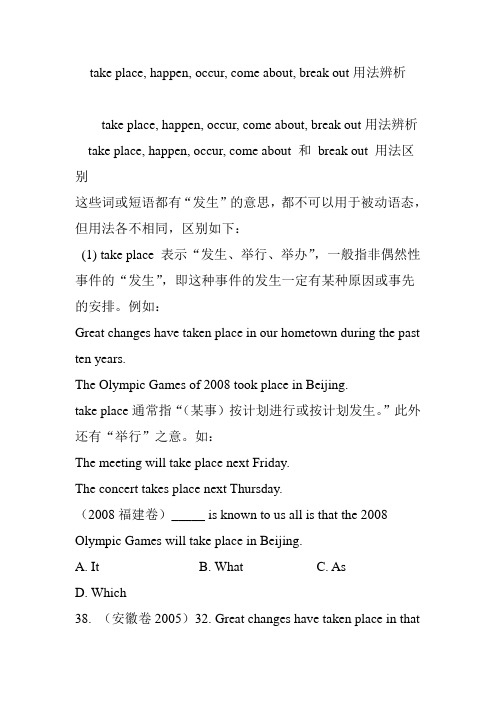
take place, happen, occur, come about, break out用法辨析take place, happen, occur, come about, break out用法辨析take place, happen, occur, come about 和break out 用法区别这些词或短语都有“发生”的意思,都不可以用于被动语态,但用法各不相同,区别如下:(1) take place 表示“发生、举行、举办”,一般指非偶然性事件的“发生”,即这种事件的发生一定有某种原因或事先的安排。
例如:Great changes have taken place in our hometown during the past ten years.The Olympic Games of 2008 took place in Beijing.take place通常指“(某事)按计划进行或按计划发生。
”此外还有“举行”之意。
如:The meeting will take place next Friday.The concert takes place next Thursday.(2008福建卷)_____ is known to us all is that the 2008 Olympic Games will take place in Beijing.A. ItB. WhatC. AsD. Which38. (安徽卷2005)32. Great changes have taken place in thatschool. It is no longer ______ it was 20 years ago, _____ it was so poorly equipped./A. what; when B. that; which C. what; which D. which; that (名词)(2) happen 作“发生、碰巧”解,常指具体事件的发生,特别指那些偶然的或未能预见的“发生”,一般用于偶然或突发性事件。
take place, happen, occur, come about和break out用法区别

take place, happen, occur, come about和break out用法区别这些词或短语都有“发生”的意思,但用法各不相同,区别如下:(1). take place 表示“发生、举行、举办”,一般指非偶然性事件的“发生”,即这种事件的发生一定有某种原因或事先的安排,例如:Great changes have taken place in our hometown during the past ten years.The Olympic Games of 2008 will take place in Beijing.(2) .happen作“发生、碰巧”解,一般用于偶然或突发性事件,例如:What happened to you? (一般不说:What did you happen?)Maybe something unexpected happened.I happened to see him on my way home.= It happened that I saw him on my way home.(3). occur作“发生、想到、突然想起”解,其意义相当于happen,例如:What has occurred? (=What has happened?)A big earthquake occurred (=happened) in the south of China last month.It occurred to me that she didn’t know I had moved into the new house.(4). come about表示“发生、产生”,多指事情已经发生了,但还不知道为什么,常用于疑问句和否定句,例如:When Mother woke up, she didn’t know what had come about.I’ll never understand how it came about that you were late three times a week.Do you know how the air accident came about?(5). break out意思为“发生、爆发”,常指战争、灾难、疾病或者争吵等事件的发生,也可以表示突然大声叫喊等,例如:Two world wars broke out last century.A fire broke out in the hospital in the mid-night.After the flood, diseases broke out here and there.She broke out, “That is too unfair!”occur vi. 1发生2 想起,想到常用搭配:sth. occurs to sb.:某人突然想起某事;It never occurred to sb. that…:某人从未想到……More people are afraid to take planes because several air crashes have occurred this month. Suddenly a good idea occurred to her.It never occurred to us that the well-dressed man was a pickpocket.我们决没有想到,那个衣冠楚楚的人是个扒手。
几个“发生” 的 区别
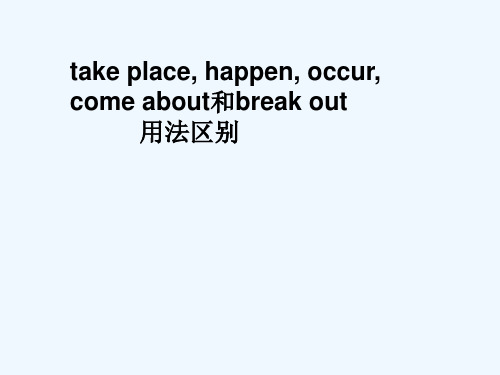
take place 表示“发生、举行、举办”,一般指非偶然性 事件的“发生”,即这种事件的发生一定有某种原因或事 先的安排, 例如:
Great changes have taken place in our hometown during the past ten years.
ቤተ መጻሕፍቲ ባይዱ
The Olympic Games of 2008 will take place in Beijing.
happen作“发生、碰巧”解,一般用于偶然或突发性事件 例如: What happened to you? (一般不说:What did you happen?) Maybe something unexpected happened.
come about表示“发生、产生”,多指事情已经发生了, 但还不知道为什么,常用于疑问句和否定句, 例如: When Mother woke up, she didn’t know what had come about. I’ll never understand how it came about that you were late three times a week. Do you know how the air accident came about?
I happened to see him on my way home. = It happened that I saw him on my way home.
occur作“发生、想到、突然想起”解,其意义相当于 happen, 例如: What has occurred? (=What has happened?) A big earthquake occurred (=happened) in the south of China last month. It occurred to me that she didn’t know I had moved into the new house.
takeplace,happen,occur,comeabout,breakout用法辨析.doc
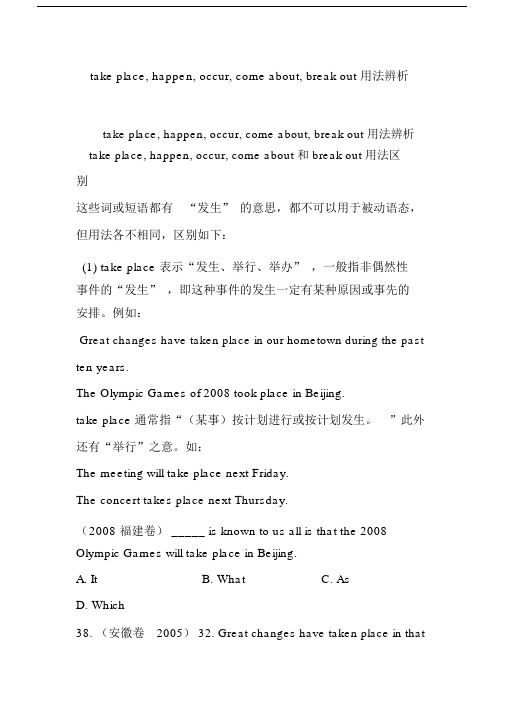
take place, happen, occur, come about, break out 用法辨析take place, happen, occur, come about, break out 用法辨析take place, happen, occur, come about 和 break out 用法区别这些词或短语都有“发生”的意思,都不可以用于被动语态,但用法各不相同,区别如下:(1)take place 表示“发生、举行、举办” ,一般指非偶然性事件的“发生” ,即这种事件的发生一定有某种原因或事先的安排。
例如:Great changes have taken place in our hometown during the past ten years.The Olympic Games of 2008 took place in Beijing.take place 通常指“(某事)按计划进行或按计划发生。
”此外还有“举行”之意。
如:The meeting will take place next Friday.The concert takes place next Thursday.(2008 福建卷) _____ is known to us all is that the 2008 Olympic Games will take place in Beijing.A. ItB. WhatC. AsD. Which38. (安徽卷2005) 32. Great changes have taken place in thatschool. It is no longer ______ it was 20 years ago, _____ it was so poorly equipped./A. what; when B. that; which C. what; which D. which; that(名词)(2)happen 作“发生、碰巧”解,常指具体事件的发生,特别指那些偶然的或未能预见的“发生” ,一般用于偶然或突发性事件。
中考英语常用短语的区别与运用(一)
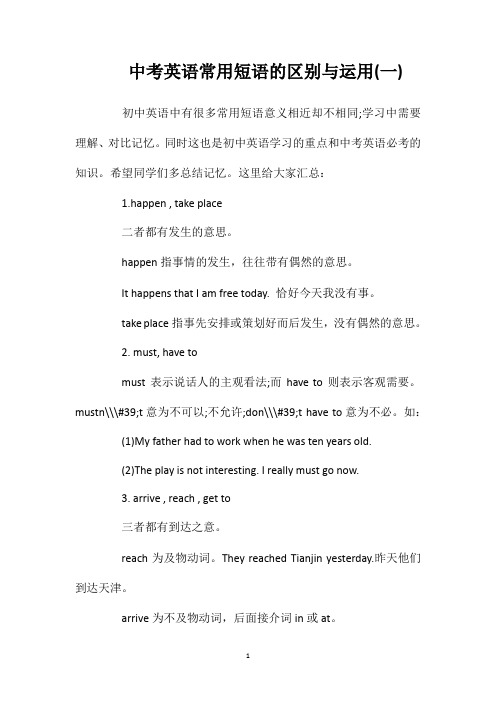
中考英语常用短语的区别与运用(一)
初中英语中有很多常用短语意义相近却不相同;学习中需要理解、对比记忆。
同时这也是初中英语学习的重点和中考英语必考的知识。
希望同学们多总结记忆。
这里给大家汇总:
1.happen , take place
二者都有发生的意思。
happen指事情的发生,往往带有偶然的意思。
It happens that I am free today. 恰好今天我没有事。
take place指事先安排或策划好而后发生,没有偶然的意思。
2. must, have to
must表示说话人的主观看法;而have to则表示客观需要。
mustn\\\#39;t意为不可以;不允许;don\\\#39;t have to意为不必。
如:
(1)My father had to work when he was ten years old.
(2)The play is not interesting. I really must go now.
3. arrive , reach , get to
三者都有到达之意。
reach为及物动词。
They reached Tianjin yesterday.昨天他们到达天津。
arrive为不及物动词,后面接介词in或at。
get to常用于口语,可代替前二者。
英语核心词汇详解happen, take place, occur辨析

英语核心词汇详解happen, take place, occur辨析happen, take place与occurhappen是不及物动词,作“发生”解时,可指偶然的事故,多用于客观事物情况的发生,也可指有计划或无计划发生的事。
一般以事件、环境、形势等作主语,表示“某人发生某事”时,须以介词to引出“某人”。
如:The accident happened at 5 o'clock. 事故发生在五点钟。
Whatever has happened to your arm? It’s all swollen。
你的手臂怎么了?肿得好厉害。
occur 基本意思是“呈现在视野、思想、意识中”,指有计划地使某些事“发生”,有时强调“呈现”于人的知觉中。
occur常与介词to连用,意为“发生”“想起”等。
occur一般只用作不及物动词,含有“出乎意料”的意味,不可用于表达意料之中或计划之中的事情,也不与suddenly连用。
Did it occur to you to phone them about it?你难道没想到就这事给他们打个电话?当具体事物、事件作主语时,happen和occur可以通用。
如:The accident happened/occurred yesterday。
事故是昨天发生的。
The earthquake occurred/happened at dawn.地震发生在黎明时分。
take place 指事件发生,但常用来表示“举行”的意思,带有非偶然性,其后面一般不跟to sb./sth.指必然会发生的事情时,多用take place.例如:The meeting took place last night. 会议昨晚举行。
Great changes have taken place in China.中国发生了翻天覆地的变化。
引导时间状语从句的连词:when, while, as, before, after, until, till, as soon as, since等。
come about,happen,take place,break out,occur
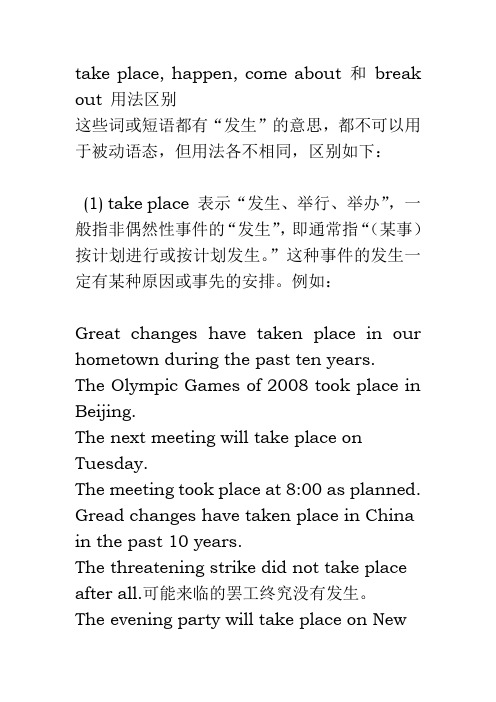
take place, happen, come about 和break out 用法区别这些词或短语都有“发生”的意思,都不可以用于被动语态,但用法各不相同,区别如下:(1) take place 表示“发生、举行、举办”,一般指非偶然性事件的“发生”,即通常指“(某事)按计划进行或按计划发生。
”这种事件的发生一定有某种原因或事先的安排。
例如:Great changes have taken place in our hometown during the past ten years.The Olympic Games of 2008 took place in Beijing.The next meeting will take place on Tuesday.The meeting took place at 8:00 as planned. Gread changes have taken place in China in the past 10 years.The threatening strike did not take place after all.可能来临的罢工终究没有发生。
The evening party will take place on NewYear's Eve.晚会将在除夕那天举行。
When did this conversation take place?这次谈话是在什么时候?When does the draw take place? 抽奖什么时候举行?When will the marriage take place? 婚礼什么时候举行?A singing meet will take place next week. 下周将举行歌咏会。
It is not certain when it will take place. 不能确定这事什么时候会发生。
